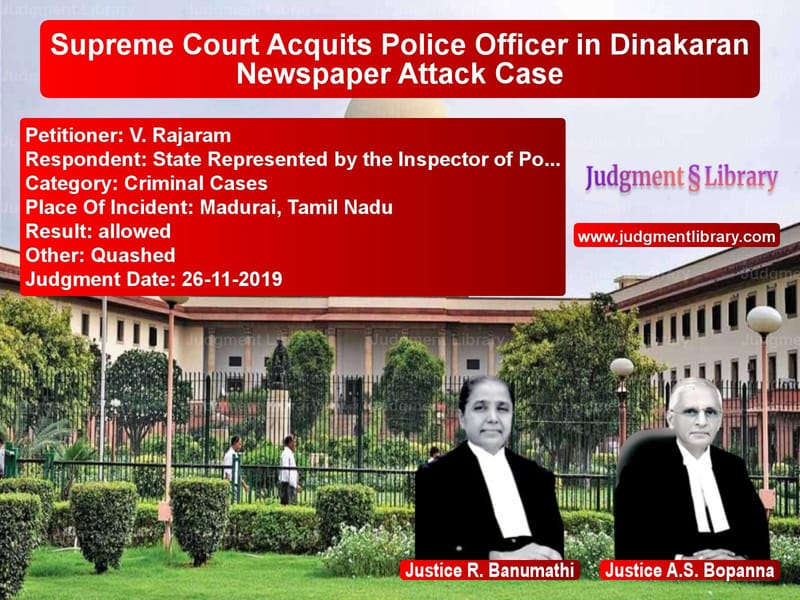Supreme Court Acquits Police Officer in Dinakaran Newspaper Attack Case
On November 26, 2019, the Supreme Court of India delivered its judgment in the case of V. Rajaram vs. State Represented by the Inspector of Police CBI/SCB. The case involved the attack on the office of Dinakaran Newspaper in Madurai on May 9, 2007, which resulted in the deaths of three employees. The Supreme Court overturned the conviction of V. Rajaram, a Deputy Superintendent of Police, who was earlier convicted by the Madras High Court under Sections 217 and 221 of the Indian Penal Code (IPC) for his alleged failure to prevent the crime and apprehend the accused.
Background of the Case
The case originated from a violent attack on the office of Dinakaran newspaper, triggered by a public opinion poll published by the newspaper, which suggested that M.K. Stalin had greater public approval as the political successor to the then Chief Minister M. Karunanidhi than his elder brother M.K. Alagiri. The attack, led by a group of individuals armed with sticks and iron rods, resulted in arson and vandalism, leading to the deaths of three newspaper employees who were trapped in the fire.
The Tamil Nadu government initially handled the investigation, but later transferred it to the Central Bureau of Investigation (CBI). The CBI filed charges against 17 accused, including political supporters and police personnel. The trial court acquitted Rajaram, but the Madras High Court reversed the acquittal and convicted him, leading to the present appeal before the Supreme Court.
Key Legal Issues
The Supreme Court examined three key legal issues:
- Whether the evidence supported a conviction under Sections 217 and 221 IPC.
- Whether the appellant deliberately failed in his duty to prevent the attack and apprehend the accused.
- Whether the High Court was justified in reversing the trial court’s acquittal.
Arguments of the Appellant (V. Rajaram)
The appellant’s counsel contended that:
- He was not the senior-most police officer present at the scene, as the security arrangement was under the supervision of Additional Superintendent of Police (PW-30).
- The trial court rightly found that he did not have direct responsibility for the failure to prevent the attack or arrest the accused immediately.
- There was no evidence to prove intentional negligence or aiding the escape of the accused.
Arguments of the Respondent (CBI)
The prosecution argued that:
- The appellant failed to take appropriate action despite having a team of police personnel with firearms and riot control equipment.
- He was seen in video footage walking alongside the accused, suggesting complicity.
- The High Court rightly reversed the trial court’s order, as the appellant’s inaction allowed the crime to escalate.
Supreme Court’s Observations
1. Applicability of Sections 217 and 221 IPC
Section 217 IPC applies when a public servant disobeys the law with the intent to save an accused from punishment. Section 221 IPC penalizes a public servant who intentionally allows an accused person to escape. The Supreme Court noted:
“The prosecution must prove beyond reasonable doubt that the appellant deliberately failed in his duty and acted with the intent to shield the accused.”
2. Role of the Appellant in the Incident
The Court found that security arrangements at the Dinakaran office were managed by PW-30, the Additional Superintendent of Police, and the appellant acted under his directions.
“The appellant was not the highest-ranking officer in charge. His actions were guided by his superior, and no evidence suggests he disobeyed any legal directions.”
3. High Court’s Reversal of Acquittal
The Supreme Court reiterated that appellate courts should not interfere with acquittals unless the trial court’s findings were perverse or based on an incorrect appreciation of evidence.
“When two views are possible, the view favoring the accused must be adopted. The High Court erred in overturning the acquittal without clear evidence of intentional misconduct.”
Final Judgment
The Supreme Court ruled:
- The conviction under Sections 217 and 221 IPC was set aside.
- The appellant was acquitted of all charges.
- The authorities were directed to reinstate his pension and retirement benefits.
Legal Implications of the Judgment
This judgment has significant implications for cases involving alleged dereliction of duty by police officers:
- Limited Liability of Subordinate Officers: The ruling clarifies that subordinate officers cannot be held criminally liable for failures in security arrangements unless direct disobedience is proven.
- High Threshold for Reversing Acquittals: The decision reaffirms that appellate courts must exercise restraint when overturning acquittals.
- Judicial Review of Video Evidence: The Court stressed the importance of proper authentication of video and photographic evidence.
Conclusion
The Supreme Court’s decision in V. Rajaram vs. State Represented by the Inspector of Police CBI/SCB reinforces fundamental principles of criminal law, particularly regarding burden of proof and the role of appellate courts in reviewing acquittals. By acquitting the appellant, the Court ensured that liability for law enforcement failures is assigned based on evidence rather than presumption.
Petitioner Name: V. Rajaram.Respondent Name: State Represented by the Inspector of Police CBI/SCB.Judgment By: Justice R. Banumathi, Justice A.S. Bopanna.Place Of Incident: Madurai, Tamil Nadu.Judgment Date: 26-11-2019.
Don’t miss out on the full details! Download the complete judgment in PDF format below and gain valuable insights instantly!
Download Judgment: V. Rajaram vs State Represented by Supreme Court of India Judgment Dated 26-11-2019.pdf
Direct Downlaod Judgment: Direct downlaod this Judgment
See all petitions in Custodial Deaths and Police Misconduct
See all petitions in Bail and Anticipatory Bail
See all petitions in Terrorist Activities
See all petitions in Judgment by R. Banumathi
See all petitions in Judgment by A. S. Bopanna
See all petitions in allowed
See all petitions in Quashed
See all petitions in supreme court of India judgments November 2019
See all petitions in 2019 judgments
See all posts in Criminal Cases Category
See all allowed petitions in Criminal Cases Category
See all Dismissed petitions in Criminal Cases Category
See all partially allowed petitions in Criminal Cases Category







